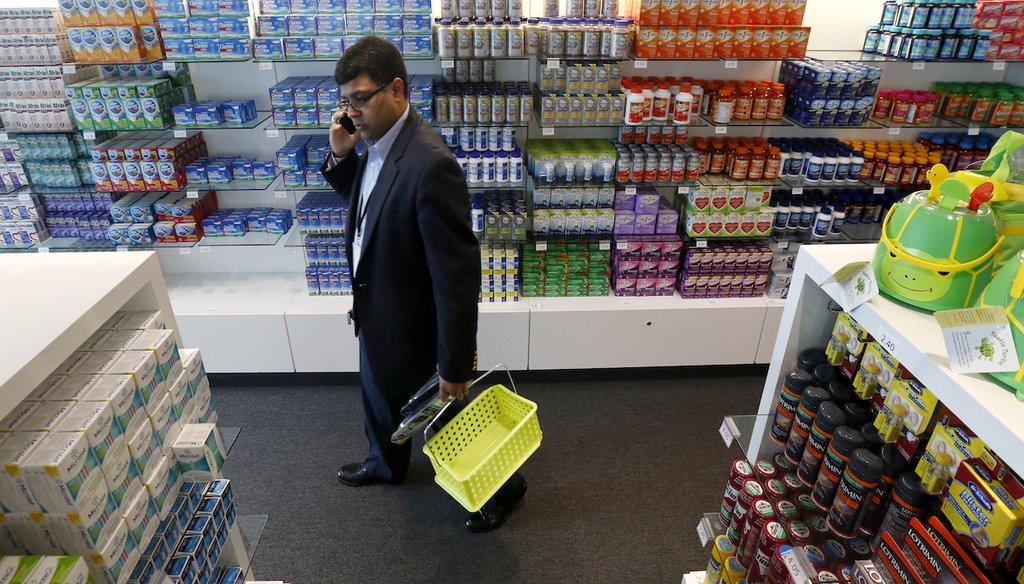



In this photo from May 13, 2015, a a Bayer Pharmaceuticals employee shops at the employee shop in the company's facility in Whippany, N.J. (AP)
Chewable Flintstones vitamins have been around for generations, outliving the popular cartoon TV show for which they were named. But a video shared on social media claims the childhood supplement is potentially deadly.
"The Toxic Ingredient in Your Kids Vitamins," read the words across the top of the July 28 Facebook video that shared a clip from a podcast. In it, guest Gary Brecka warns against the vitamin B12, which he says is an ingredient in Flintstones and other supplements.
"The most common form of B12 in the world is entirely synthetic. We make it from hydrogen cyanide," said Brecka, who describes himself in his LinkedIn profile as founder of a Florida-based health business. "It’s called cyanocobalamin. It’s a cyanide-based B12. I mean it’s hard to believe that we’re allowed to make vitamins out of hydrogen cyanide in this country, but we are. Flintstones vitamins have cyanocobalamin."
The post was flagged as part of Facebook’s efforts to combat false news and misinformation on its News Feed. (Read more about our partnership with Facebook.)
Is it true that children’s vitamins have synthetic cyanide? We reached out to Brecka to ask for more information to support his statements, but did not receive a response in time for publication.
Flintstones vitamins do contain cyanocobalamin, which is man-made B12. But the video’s claim that the ingredient is toxic is wrong.
The Mayo Clinic describes B12 as a vitamin that "plays an essential role in red blood cell formation, cell metabolism, nerve function and the production of DNA, the molecules inside cells that carry genetic information."
According to the National Institutes of Health, B12 is naturally present in some foods, notably animal products, and dissolves in water. It’s also added to foods or given as a supplement, the agency wrote. In The synthetic form, cyanocobalamin, is usually given to people who have low levels of B12.
NIH’s fact sheet for health professionals says B12 has a "low potential for toxicity." The agency notes that cyanocobalamin is also safe — no overdosage occurs.
"Even at large doses, vitamin B12 is generally considered to be safe because the body does not store excess amounts," read the fact sheet.
A separate NIH fact sheet, written for consumers, also states that B12 supplements are safe, even at doses higher than recommended — and for the same reason: "the body absorbs only a small percentage of it," it says.
Dr. Herman B. Gray, chair of Wayne State University’s Department of Pediatrics, told PolitiFact that for most people, eating a balanced, healthy diet provides enough B12, and taking a supplement is usually unnecessary. But, he said, "it is safe to take in prescribed dosages, including for children."
Cyanocobalamin is not the same as the poison cyanide, Gray said. Cyanocobalamin has only a molecule of cyanide, which is not enough to cause poisoning.
In an article on B12 supplements, the science and technology news site Gizmodo explained it this way: "Don’t panic. The body can deal with small amounts of cyanide, usually by using sodium thiosulfate, converting the cyanide ions to thiocyanate, which you then excrete. Cyanocobalamin is safe, and found in food additives, health supplements and the injections that doctors give patients with anemia."
Gray concurred, noting that B12 has been used safely for decades. "Vitamin B-12 or cyanocobalamin is not toxic," he said.
A video on a Facebook post claims that the synthetic form of B12 found in children’s vitamins is toxic.
Cyanocobalamin is man-made B12, but health organizations and pediatricians say it’s safe to consume.
We rate this claim False.
Facebook post, July 28, 2022
National Institutes of Health, Vitamin B12 Fact Sheet for Health Professionals, accessed Aug. 1, 2022
National Institutes of Health, National Library of Medicine, Cyanocobalamin, accessed Aug. 2, 2022
ConsumerLab, I'm over 50 and looking to take a vitamin B-12 supplement. Many contain a form of vitamin B-12 called cyanocobalamin, yet I read on the Internet that this form is toxic. Should I be concerned? June 10, 2012
Gizmodo, There's cyanide in artificial vitamin B12, And that's OK, Nov. 24, 2015
Email interview with Dr. Herman B. Gray, chair of the Wayne State University Department of Pediatrics, Aug. 1, 2022
In a world of wild talk and fake news, help us stand up for the facts.
